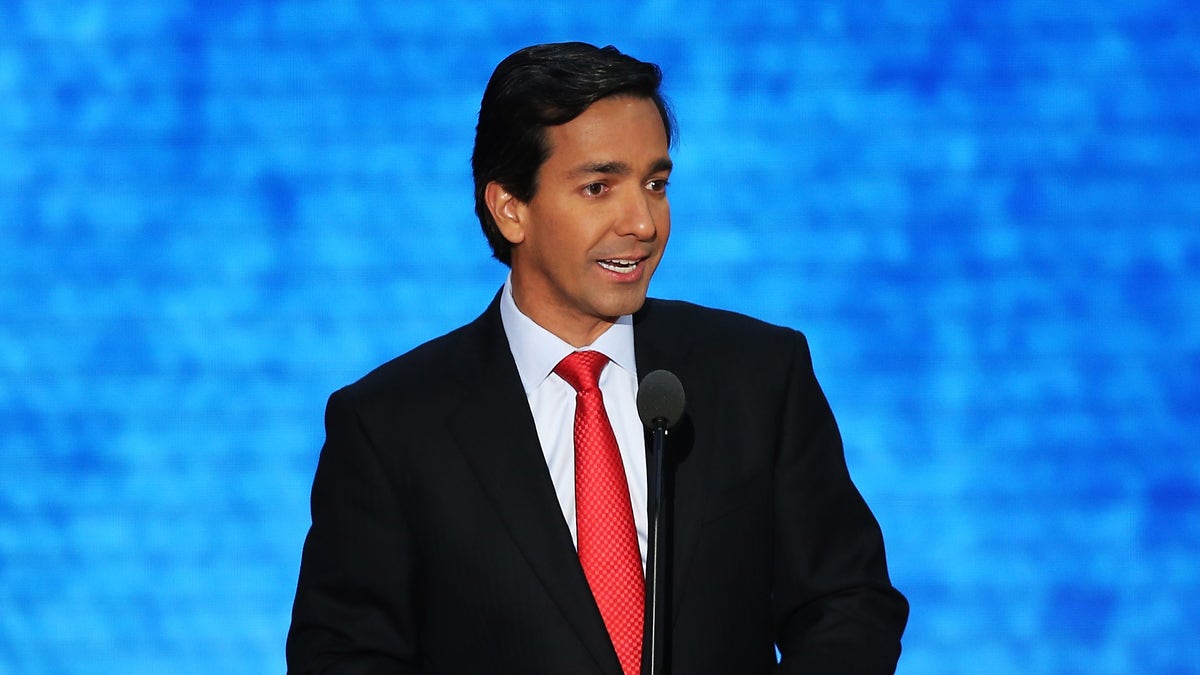
TAMPA, FL - AUGUST 29: Puerto Rico Gov. Luis Fortuno speaks during the third day of the Republican National Convention at the Tampa Bay Times Forum on August 29, 2012 in Tampa, Florida. Former Massachusetts Gov. Former Massachusetts Gov. Mitt Romney was nominated as the Republican presidential candidate during the RNC, which is scheduled to conclude August 30. (Photo by Mark Wilson/Getty Images) (2012 Getty Images)
With attention focused on the race for the White House, another election with national implications is flying under the radar.
Other than Scott Walker, who overcame a recall effort earlier this year, Gov. Luis Fortuño of Puerto Rico is the first of the Tea-Party era Republican reformers to face voters after implementing fiscal discipline as governor.
Gov. Fortuño’s fortune will be a barometer for many young, dynamic Republican leaders, including fiscal hawks like Chris Christie, Rick Snyder and Bob McDonnell, as well as Nikki Haley and Susana Martinez, the first female Indian- and Hispanic-American governors in history.
Sworn in in 2009, Fortuño facilitated Puerto Rico’s economic renaissance by cutting government spending, reducing taxes, making government more efficient and boosting private sector productivity.
Fortuño had a much deeper hole to dig out of than any other American governor: unlike the states, Puerto Rico is not constitutionally required to have a balanced budget.
Two months after his swearing in, Fortuño cut government expenditures by over $2 billion from a budget of $13 billion – including a 10 percent decrease in his own salary– and trimmed thousands of redundant government workers, including a 30 percent cut in political appointees.
These cuts reduced Puerto Rico’s budget deficit by 90 percent, and in 2013 Puerto Rico will have a balanced budget for the first time in years.
This January, Fortuño implemented Puerto Rico’s largest tax cuts in history.
Taxes were cut by 50 percent for individuals, and for corporations the top rate dropped from 41 percent to 30 percent and will fall to 25 percent in 2014.
Businesses that create jobs in Puerto Rico will pay a rate as low as 4 percent and receive tax-exempt status on dividends.
Rather than govern cautiously in order to remain popular in a difficult political climate, Fortuño spent his political capital implementing a reformist agenda.
But like many other new Republican governors, Fortuño received significant pushback in the form of protests from government unions. It was a similar scene to the one that played out in Wisconsin. And like Scott Walker, Fortuño’s results will speak for themselves.
Between April 2010 and March 2011, all three of Moody’s, Fitch and Standard & Poor’s raised Puerto Rico’s credit rating.
From a high of 16.4 percent, unemployment in Puerto Rico has fallen every month since Gov. Fortuño’s tax cut package. The current rate of 13.7 percent is still high, but the decrease is more than double the national decline in unemployment over the same period.
Now that Fortuño’s tax relief package is taking effect, the economic outlook is bright: indicators in retail sales, auto sales, home sales and cement sales are in positive territory.
June was the seventh consecutive month of positive year-over-year growth, a trend Puerto Rico had not seen since March 2006.
In fiscal year 2012, the economy of Puerto Rico will see positive economic growth for the first time in 6 years.
In fact, all seventeen states that elected a Republican governor in 2010 have experienced drops in unemployment. These states are creating jobs at a rate 50 percent higher than the nationwide rate.
In New York, unemployment has risen from 8 percent to 9.1 percent since March 2011.
The Mercatus Institute has ranked us 50th out of 50 states in terms of economic freedom, independent surveys rank New York as one of the least business friendly states and our economy remains in the doldrums.
In a poll last month, Gov. Fortuño is trailing his challenger by five points, while Gov. Cuomo’s approval rating is at 70 percent.
When governors play it safe, their approval ratings may soar –but their states will founder. When governors spend their political capital, their poll numbers may take a hit, but their states and indeed the nation will be the better for it.
With Scott Walker having survived his recall, the next major battle over responsible government will play out in Puerto Rico this fall.
Can the politics of fiscal discipline and economic growth be political winners, or will the safe politics of the status quo prevail?




